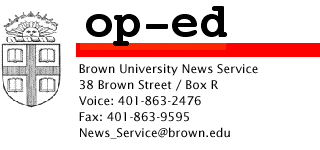

|
Distributed December 2001 Copyright ©2001 by Calvin Goldscheider |
Op-Ed Editor: Mark Nickel About 820 Words | |
|
Calvin Goldscheider Terrorism, Israel and America The sense of national unity that followed the World Trade Center attacks has allowed the United States to undertake a strong response to terrorism. But enemies also develop unity when they, in turn, are attacked. We should not let our sense of national unity erode the natural strength of our diversity. Listening to the voices of dissent is the best insurance for our continuing democratic values. After September 11 and as the level of violence rises between Israel and the Palestinians, one hears an overriding message in Israel and among Americans: Maybe now Americans can begin to appreciate why Israel has needed to respond militarily to the repeated terrorist attacks from its Arab/Palestinian enemies and why Prime Minister Sharon has decided not to negotiate with Palestinians until a ceasefire is observed. These are the wrong messages and distorted themes for both the American and the Israeli governments. There is much to be learned in America and in Israel by examining how states have responded to terrorism, but the implications of such comparisons are quite different than some of the current wisdom. The way to understand terrorism and the terrorists is to put yourself in their place, to see the world through their eyes. In this case, we need to understand how the enemies of America and of Israel think about the world and how they view the values those two nations hold dear. If we are unable to do that, we shall end up with distorted targets for our own aggression and the greater likelihood of continued terrorism. What are the major lessons for America from the Israeli responses to terrorism? The first and most obvious lesson emerges from the enormous unity in the United States in the aftermath of the terrorist attacks. Rarely, indeed, have internal divisions within our government or among our diverse population been put aside in the common response to being attacked. In a similar way, the common external enemy of terrorism has held Israel’s internal ethnic and religious divisions in check. There is great value in such unity, particularly the ability to pursue new and creative policies in preventing further attacks. But the real lesson to draw from this observation is that the enemy also gains strength and unity by being attacked. Just as the Palestinians of all political orientations have been united by Israel’s military attacks, so too can we expect that the September 11 terrorists and their protectors, their cousins and co-religionists, will band together in common bonds against their attackers. While unity has major advantages, so does dissensus. Let us not lose the value of our diversity by presuming unity of goal and strategy. Listening to the voices of dissent is the best insurance for our continuing democratic values. You cannot have one voice unless different voices have the option of articulating dissenting views. A second lesson from the Israeli and American experiences must be the immorality of attacking civilians along with the terrorists and those who harbor them. Many have noted the important distinctions between attacking military targets and civilian buildings. Our outrage at the attacks on the World Trade Center has been fueled by the innocence of the victims and indiscriminate lumping of all Americans into the same category as targets. A terrorist attack on civilians in a Jerusalem pizza eatery carries with it graver implications than the shelling of an Israeli military target in Gaza. We mourn the deaths and injuries in both cases, of course, but we separate the two on moral grounds. Can our response to terrorism be any less discriminating? Can we think of attacking people and countries because they are the friends and relatives of our enemies? Clearly, we do not want to negotiate with terrorists. But must we include their friends, families and allies in that ban? Should we only negotiate with our allies and friends? We need to negotiate so that we can understand our enemies and they can understand us. Ultimatums have not worked in the past and are unlikely to work in Afghanistan or between Israel and Hamas. We need not become terrorists to fight terrorism. We like to consider justice an absolute. We have in mind conceptions of justice that are drawn from our own set of values. We should have learned from Israeli and American histories that our system of justice is not everyone’s justice. Nor is it a perfect system. Others may view our justice as aggression and terrorism. If we cannot put ourselves in the position of the other to understand the world view of the other, we will not see how we are seen nor will we get at the issues that are at the foundation of broad international conflict. We certainly do not accept the justice system of our enemies. Can we always expect them to accept our system? The lessons to be learned from others are that military operations against civilian targets are sources of unity for our enemies as much as for ourselves, that justice is a variable not an absolute, that we need to negotiate with our enemies, and that we learn much by listening to diverse voices. The leadership of Israel and America needs to hear the enemies, exact justice with care and preserve the values that make both countries a light unto the nations of the world. Calvin Goldscheider is professor of sociology and Ungerleider Professor of Judaic Studies at Brown University. He is the author of the recently published Cultures In Conflict: The Arab-Israeli Conflict, Greenwood Press. ###### | ||